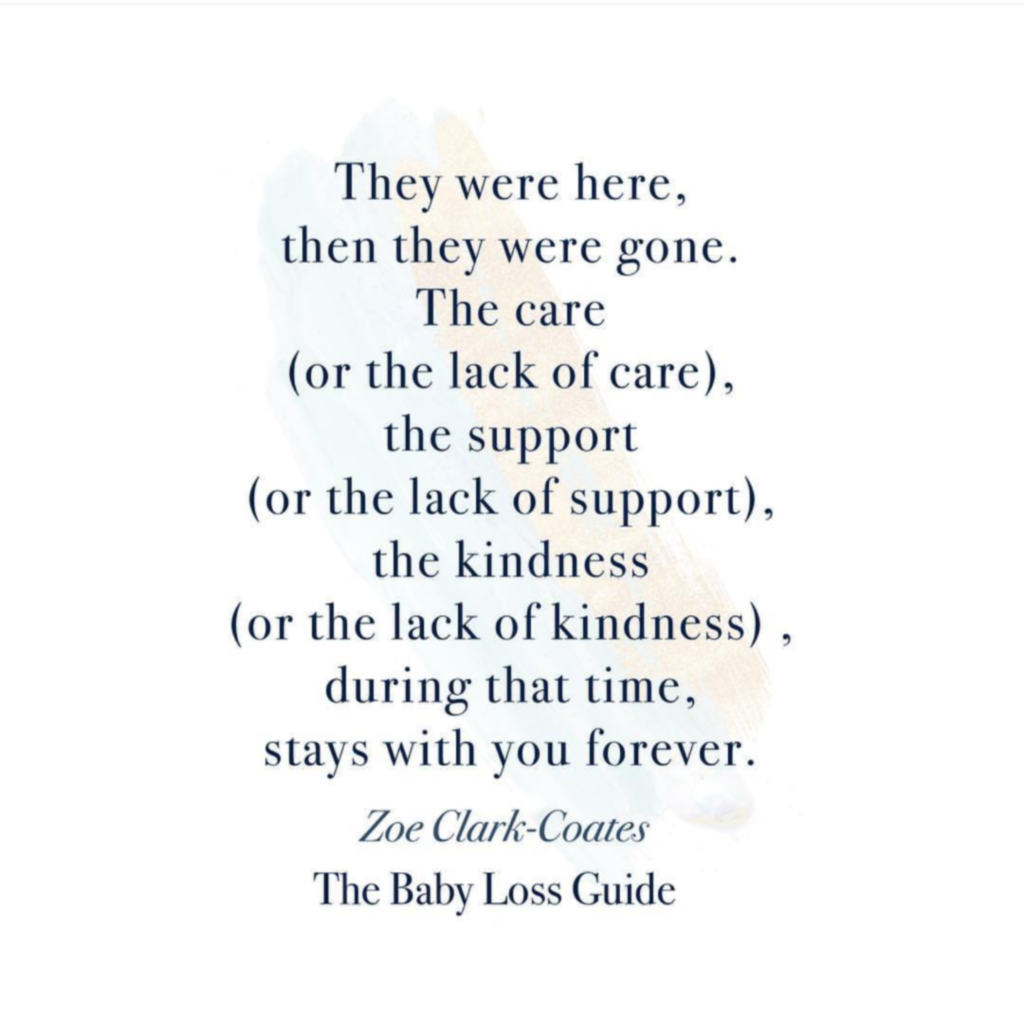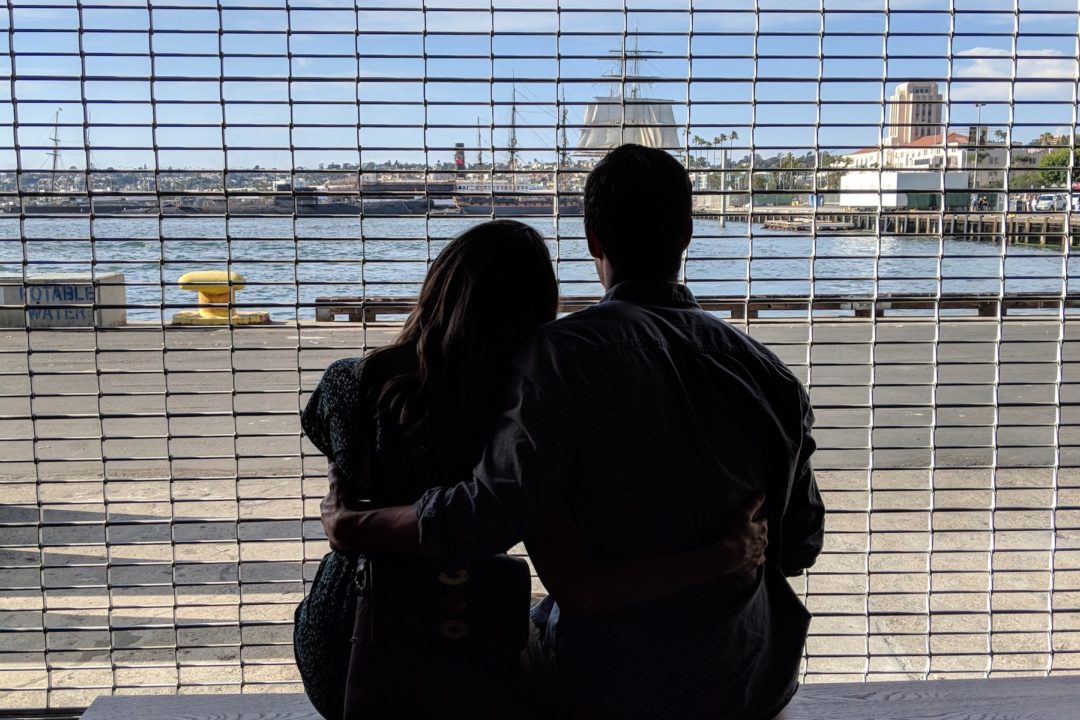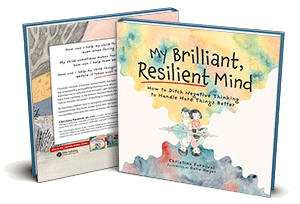The following post is about miscarriage. Currently, many who suffer miscarriages suffer alone, and those who do share their stories often aren’t met with the support they need. This post is a miscarriage PSA as a voice to help shift the societal norm of not talking about pregnancy loss as well as to offer tips for how others can support a grieving couple.
Miscarriage is unfair, terrible, painful.
It is one of those things that parents-to-be fear may happen to them.
One of those things that unfortunately does occur to 1 in 4 women.
And one of those things that is not talked about much, leading those going through it to feel mightily alone.
Miscarriage so often occurs that it is a common practice to avoid telling friends and loved ones about our pregnancies until after the 12 week mark, where the risk decreases significantly. The idea is that if we lose a baby in the early stages of pregnancy, and have not told anyone yet, then we don’t have to go through the awkward and painful hassle of telling everyone that we are no longer pregnant. It sounds very practical. But, practical does not equal painless or healthy.
My concern about the common approach to pregnancy and pregnancy loss is that it has the potential to be even more painful.
Often this grieving mama is left to suffer alone, retreating within, by not sharing about the miscarriage.
There is this sense that sharing the news is “tmi” (too much information) for others, too heavy, too personal, too negative. Or, if she does decide to share about it with her closest confidants, she is stressed about navigating how to broach the subject, which involves also telling them she was pregnant in the first place.
What’s more is that the accumulation of a society’s silent miscarriages leads many couples to feel alone in their loss.
One of the best ways to process and heal from grief is to relate to others, feel their support and love, learn what helped them, and express feelings.
But, how can a mama find this from friends and family if she thinks she does not know anyone else who has gone through the same thing?
The reality is, this mama most likely knows several women who have suffered, she just doesn’t know that she does.
This mama walks around, unknowingly surrounded by others who have felt a similar pain, alone. She feels isolated in a sea of sisters. If only everyone had been open during their experience, she would have waves of support and love.
Another repercussion of the societal silence is that we aren’t practiced in how to offer help or support for a grieving mama.
Don’t get me wrong, we try to do our best on the fly.
We give sympathetic looks, we say “let me know if there anything I can do”, but we don’t know what to do, and we move on, afraid of the uncomfortable conversation that is so often avoided.
In speaking with my mom friends who have been there for a friend or who have suffered a miscarriage themselves, I have compiled a list of ways to support a grieving mama:
- Ask her how she’s doing, and let her know that it’s okay to mourn. Don’t avoid the topic in fear of bringing up something that might make her sad. She already is sad. Show her you care. That said, if she doesn’t feel like talking after you’ve asked, respect that.
- Give her a hug — like a real hug. Hug her tight. Let her cry if she needs to.
- Make her something yummy to eat. It could be dinner, it could be dessert, it doesn’t matter. This not only shows love but saves her from having to plan and make food for herself when she might not have the drive to.
- If she is already a mom, offer to watch her kids. Give her a chance to grieve without having to tend to other little people. It will give her the rare opportunity to be able to put her needs and feelings first.
- If you feel close enough with the other parent, or if your partner is, check in with them too. They may not have gone through the physical miscarriage, but they are still affected, hurt, sad, and grieving too.
- If you have been through a miscarriage and feel comfortable sharing about it, relate with this mama. Let her know you’ve been there. Tell her what was helpful to you.
- Offer to do any of the above suggestions and see what resonates with her. Say “I want to help,” and tell her specifically the ways in which you can (such as the items above). Maybe she’ll pick what sounds best to her.
- If you don’t live near, send a card. Emily McDowell has several great cards for offering support.
- Lastly, if you are a friend or family member who is pregnant, please be thoughtful in the way you speak of your own pregnancy with or in front of this mama during this sensitive time.
I hope this societal norm shifts.
I hope to see more families share about their pregnancy joys at the time that feels right to them and not just when miscarriage risk decreases.
I hope the feelings of shame, embarrassment, isolation, and fear that surround sharing about pregnancy loss fades.
I hope mamas will look for and find solace and comfort in others should they need to. And I hope we can learn how to be that solace and comfort in return.
Thank you to the contributing mamas to this post!!

Miscarriage is a serious topic that requires a lot of care and attention.
If you have suffered a miscarriage, are dealing with infertility, or are yearning for a child, see this post. Here you will hear from other moms who have been there as the offer words of wisdom that they wish they had heard during their time of need.



My heart goes out anyone who has suffered a miscarraige. I can’t imagine the pain. our society need to be better with dealing with grief as a whole. we are taught to hide it which is the worst thing one can do.
Thanks so much Loraro.
I agree, I think that we’re not so good at dealing with the “hard” things of life. I find that saying “I’m so sorry for your loss” covers so much, and not trying to say trite phrases like “Oh, you can try again” or the very stupid “God must have needed another angel” (gag). With a miscarriage it isn’t only a death, but also the death of the hopes and dreams you had for that child.
You’re exactly right. Thanks Melissa.
It’s true. Miscarriage affects a lot more women then are vocal about it. Like anything else, we all just want to be witnessed…
Yes we do! Thanks Jen.
Wonderful tips and guidance on how to support people during such a hard time. Thank you for taking on this subject!
Thanks Malia!
I have a friend who’s gone through this twice since i’ve known her. I feel so helpless. this article gives me ideas to help provide support. Thxo <3
Aw I’m so sorry to hear that about your friend. I hope you are able to find ways to show her you care. Thanks!
Th thank you for being a voice on such an important topic. Ha having to face a loss alone and in private is such a difficult thing. Hopefully as this subject becomes to be more talked about moms ( and dads) will be able to open up and share more.
Thanks Mar. I sure hope so!
Nice conversation started here. I felt isolated for sure during all my MC. It was hard to be around others especially with their kids or pregnant bellies. I know many felt as awkward being aroudn me too when they heard my news. we need to all just be there for one ANOTHER and finding the help on what to say helps = thanks
I’m so sorry that you went through a miscarriage, Angela. I’m glad you thought this was a good conversation to bring to the surface. Too many men and women feel alone.
Great information! No one ever seems to know what to say when someone has a miscarriage.
Thanks Melissa. Grief is so hard for many to find ways to support, but especially in regards to pregnancy loss!
This is all so very true – so common and yet not talked about. I did appreciate everyone who reached out when I had my miscarriage at 14 weeks.
I am so sorry that you had a miscarriage, Tiffany. I am glad you had some friends and family who reached out to you. Sending love.
This is a great article. Miscarriage is hard. When I had mine, no one knew what to say. They ignored the situation which did not help matters. Thanks for these tips.
Gosh, Heather. I am so sorry that you went through a miscarriage, and the lack of support. You’re welcome for these tips; hopefully many can learn from them!
It’s difficult to know what to say for anyone’s loss, and that indeed extends to miscarriages. Thank you for the suggestions & reminders.
Thanks Suzan.
Great advice. I had just gotten comfortable with the idea of being pregnant,and my sister had just spilled the beans to my family without my permission, only for me to experience a miscarriage several days later. It was heartbreaking. thank you for sharing this advice.
Oh my goodness, Kendra. That is devastating. I am so sorry. Sending you so much love.
It is indeed a hard topic to handle from the outsider’s place. But, if you treat it like any type of major grief, I think everybody will respond better. pretending like it didn’t happen is not the answer for sure. thanks for sharing!
You’re so right, Katherine. Thanks!
This is so beautiful. I know so many people that have gone through this journey, and have had such wonderful people around them to be there.
I am so glad those who you know who have experienced miscarriage have had the support of those around them!!
My heart goes out to anyone who has gone through this.
Thanks, Haley, mine too!
I agree 100%, Support is needed and conversation needs to happen to heal1
Yes!!
Thank you for sharing!
Thanks Nicole!
Thank you for discussing such an important topic. Others will feel less alone.
I sure hope so. Thanks Stacey.
Incredible tips! thank you for sharing!!
Thanks Robin!
Your post is so true. I miscarried my first pregnancy. And I didnt share about it for 20 years. My doctor at the time just shrugged and said go get pregnant again. It didnt seem to matter to him. It took me more Than two years to get PREGNANT again. I never even listed the MISCARRIAGE on my medical records. And yet I still think about that baby and wonder who he would have grown up to be. Its a silent epidemic I think and many women choose not to speak about their losses.
Oh wow, Cindy. I am so sorry you experienced a miscarriage. How hard to carry that pain silently for so long, and how terrible to hear your doctor be so callous. My heart goes out to you.
We often don’t know how to help someone who has gone through this. Thank you for sharing these ideas to help those of us who have never been in those shoes but want to be there for someone we care about!
You’re so welcome, Michele. Thanks!
Great insight and tips! I always appreciate those who’re willing to share their experiences and help others Through difficult times.
Thanks Magan.
Such good tips. Miscarriage and infertility in general is so hard. One of my daughters can’t have any more children – she was urged to terminate her second pregnancy, but refused. She has a rare kidney disease. Another pregnancy would kill her. So, at 25 she had to have a tubal ligation. she and her husband want more children, but they’re limited in the ways that it can happen.
Gosh Laura Lee, I am so sorry to hear about the struggles of your daughter. That must be so heartbreaking for you too. Sending love to you all!
Thank you for this. I am a retired nurse and worked in a GYNE unit in the hospital for several years.I was always horrified when they’d put a woman who had a D&C after miscarriage onto our unit, because it was mostly post-partum. I, over time, at least got two distant corner rooms reserved for these women so that the sounds of crying babies weren’t being rolled past their room all the time. This was many years ago. It is such a painful journey!!!!
Oh no, I can’t believe they would do that! You are an angel to those grieving mamas for getting corner rooms reserved for them. Wow.